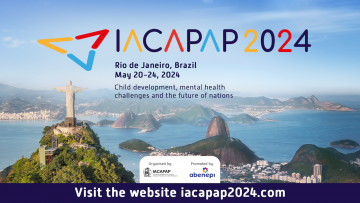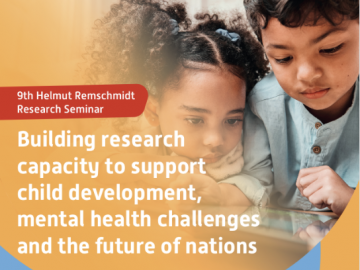IACAPAP President's Message Sep 2023
By: Professor Luis Augusto Rohde, Professor, Department of Psychiatry, Federal University of Rio Grande do Sul, Director, ADHD Program , Hospital de Clínicas de Porto Alegre, Brazil
As usual, I want to update our IACAPAP friends on the progresses made from June, the time of our last Bulletin, to September. We are working hard to accomplish our goals proposed in the Strategic Plan approved by the IACAPAP Executive Committee last July and published on our website (https://iacapap.org/about/about-iacapap.html).
Regarding our goal of catalyzing joint initiatives with other organizations to improve child and adolescent mental health awareness and evidence-based care globally, we are moving forward in our collaboration with the Child Mind Institute (CMI) in constructing a new broad, open access, culturally comprehensive instrument to assess child and adolescent mental health (CAMH). This instrument will be used to get a current global perspective on CAMH, something extremely needed. The stage of having items generated by AI, close review of generated items by a panel of experts, and initial adjustment according to psychometrics and developmental aspects is almost finished. We are approaching the exciting stage where we will invite representatives from our national member associations to assess the cultural appropriateness of the instrument. This is an essential step in the process of having a culturally valid global instrument and it can only be done with help from members of an Association with the strengths and comprehensiveness of IACAPAP. So, be prepared to embark on this journey that has the potential of giving to all community of CAMH clinicians, researchers, and other stakeholders a comprehensive global vision of behavior and emotional problems of our youths through the lens of the same evidence-based instrument that will be applied in several different countries in surveys to be conducted.
Regarding strengthening global training and professional development in child and adolescent mental health, we are also moving forward exploring a potential collaboration with CMI to contribute to the development of a Child and Adolescent Psychiatry Clinical Fellowship Program addressed to Low-Middle Income Countries (LMIC) with none or few Child and Adolescent Psychiatrists. We expect to share with the IACAPAP community the results of this initiative in our next column.
Our next World Congress of Child and Adolescent Psychiatry and Allied Professions that will take place in Rio in 2024 (see more details in this bulletin and at https://www.iacapap2024.com/ingles/index.php) is approaching soon. The Helmut Remschmidt Research Seminar (HRRS 2023) took place last month in Campos do Jordão, Brazil promoting exchange of experiences and knowledge for a selected group of young professionals, who certainly will be a brilliant future part of the CAMH research field worldwide. IACAPAP would like to express our gratitude to Professors that kindly dedicated their time to this initiative (Ana, Bruno, Lizzie and Maretha) and to Petrus and Christina who lead the process so efficiently. Submissions for symposia, posters and oral presentations for the congress are already open, and most plenary speakers are selected. Since the congress venue can accommodate no more than 2500 delegates (close to the regular number of participants in our previous Brazilian national meetings) and the fact that we are receiving a large number of early registrations, we strongly encourage those interested in being part of this wonderful meeting to register as soon as possible.
Talking about meetings, we need to decide on the location in Germany and the dates for the 2026 IACAPAP congress. In an innovative approach, we would like to listen to our IACAPAP friends about their opinion on this matter. Thus, we are launching a pool where you can vote between Berlin and Hamburg for the venue and between two dates in July 2026 for the Congress (vote here). You will be helping the Bureau in achieving the best decisions on an issue that affects all of us!
Before closing, I would like to introduce a new idea for this column. In each issue of the Bulletin, I will highlight one impactful paper for CAMH published in the literature in between the previous and the current issue. For this issue, I selected a paper by Patel et al. published in Lancet on Transforming Mental Health Systems Globally: principles and policy recommendations available on August 19, 2023. Why this paper deserves a careful read by CAMH professionals? Because authors dissected reasons for our lack of effectiveness in responding to an enormous mental health crisis worldwide including our unique reliance on a biological model for mental disorders in the last decades and enumerate five principles and four policy actions to change the game. The principals are: 1) target harmful social environments across the life course; 2) care is determined by a person’s needs, not their diagnosis; 3) empower front-line workers to deliver evidence-based psychosocial interventions; 4) embrace a rights-based perspective for mental health care; 5) place people with lived experience at the center of the care system. Across the description of principles, authors always emphasize the relevance for focusing efforts in early development and youths’ mental health and assume some values that have been always central for CAMH professionals like interdisciplinary teamwork and integration of CAMH besides health systems including for instance school environments where children and adolescents spend lots of their time. A key issue addressed in the paper is a current model of MH based on specialist care and the shortage of specialists in LMIC, an issue even more accentuated for CAMH. Moreover, the authors pointed to recent evidence from implementation science clearly demonstrating that community health workers and community members including peers can deliver effective brief psychosocial interventions for prevalent mental disorders like anxiety and depression in collaborative work with specialists. Here is a clear message for any Child and Adolescent Psychiatry Fellowship Program to be developed. There is an unequivocal relevance of training CAP in LMIC where none or few exist, but part of the training needs to be in establishing these connections with non-specialists and community members. Otherwise, there is no chance for creating innovative, culturally tuned, and evidence-based child mental health centers that have scalability to deliver interventions that really matters for a significant proportion of children and adolescents suffering from emotional and/or behavior problems.
Finally, regarding the auditable goals proposed in the previous bulletin, they were achieved, since: a) the Bureau meeting with IACAPAP Full and Affiliate members to receive suggestions was conducted last month. We are yet compelling all the material discussed to share in our next column; b) initiatives with the CMI/SNF Global Center for Child and Adolescent Mental Health are already happening, as mentioned above; c) the HRRS 2023 was already successfully conducted some days ago; d) A preliminary program for the 26th World Congress of International Association for Child and Adolescent Psychiatry and Allied Professions will be in our site up to the end of this month. The auditable goals up to the next bulletin will be:
- Engage IACAPAP community for assessing the cultural adequacy of the Multidimensional, Culturally Sensitive, and Open-Access instrument to evaluate CAMH worldwide;
- Have an agreement with CMI on potential collaborative work for the Child and Adolescent Psychiatry Fellowship Program;
- Have the almost final program of the 2024 World Congress of Child and Adolescent Psychiatry and Allied Professions available online;
- Have more than two-thirds of the expected registrations for the Congress already done;
- Have the location and dates for the 2026 IACAPAP Congress finalized.
I hope you all enjoy reading our Bulletin.



